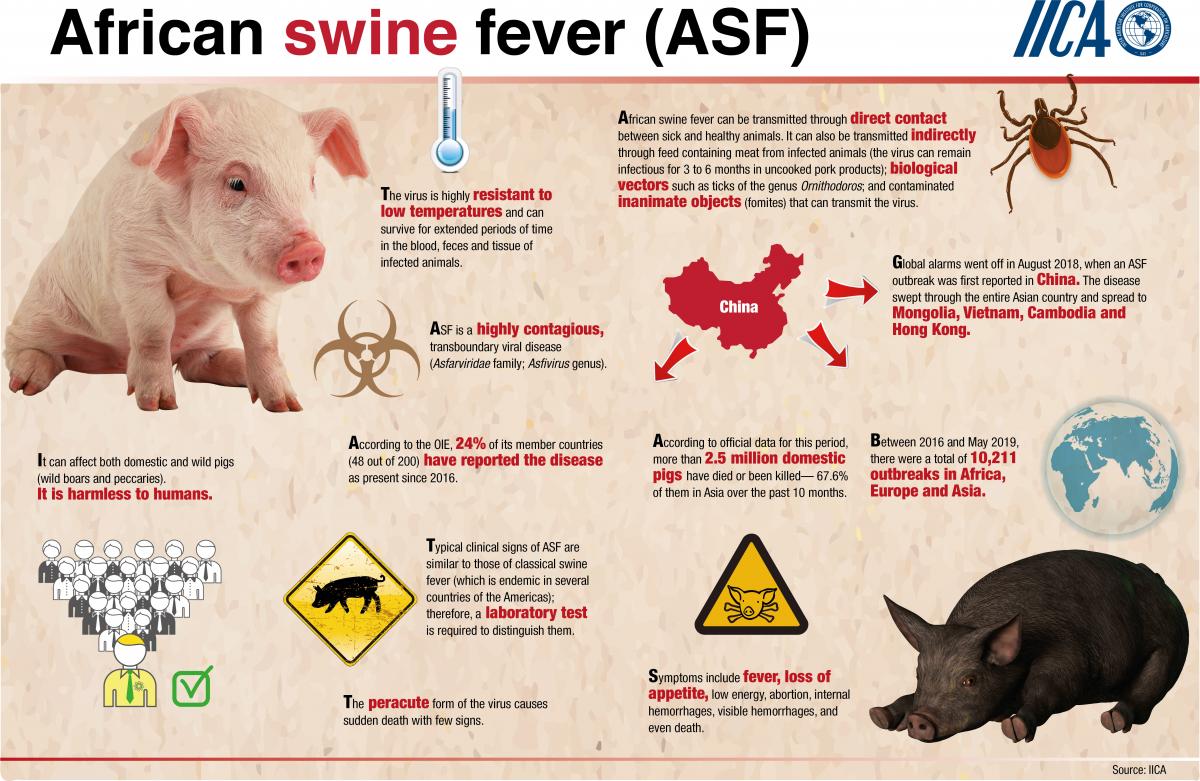IICA calls for strengthening sanitary controls to prevent the spread of African swine fever
The Director General of the Inter-American Institute for Cooperation on Agriculture (IICA), Manuel Otero, underscored the need for collaborative work between official and private veterinary services in the organization’s 34 member countries. IICA is currently planning actions aimed at strengthening emergency preparedness and response.
San Jose, 21 June 2019 (IICA). The Inter-American Institute for Cooperation on Agriculture (IICA) called for strengthening animal health and enhancing public and private veterinary services in its 34 Member States to prevent the reappearance of African Swine Fever (ASF) on the American continent.
IICA, the organization of the Inter-American System specializing in agricultural and rural development, noted that in order to prevent an outbreak of the disease, it is crucial to strengthen border controls and exercise proper disposal of food waste on airplanes and ships; redouble the surveillance of clinical signs displayed by pigs on farms to provide official safety services with adequate reports; and increase biosafety measures.

“The negative effects of the disease are compounded by the killing of animals, which is the recommended measure to contain the disease during an outbreak,” stated Robert Ahern, Leader of IICA’s Agricultural Health, Safety and Food Quality Program.
To prevent the spread of ASF, IICA has planned a number of actions, including the organization of courses on transboundary diseases, with special emphasis on ASF, to be taught in the Caribbean and Latin America; the strengthening of surveillance programs and techniques for collecting samples, with a focus on the preparation of samples and their delivery to the United States; and capacity building in emergency response.
Since an initial outbreak of the ASF virus was detected in the People’s Republic of China in August last year, the country has culled more than one million pigs. Although the disease is harmless to humans, it is highly contagious among animals, and there is currently no effective vaccine. Consequently, the disease has spread to countries like Vietnam, Mongolia and Cambodia.
It has been almost forty years since the Americas last experienced an African swine fever outbreak. It was detected in Cuba in 1971 and 1980, in the Dominican Republic in 1978, and in Haiti in 1979. The disease had devastating effects and generated significant losses. During that period, IICA played a leading role in eradicating the disease.
The leader of IICA’s Agricultural Health, Safety and Food Quality Program also noted that the “movement of goods, especially pork and pork products, as well as passengers between Europe, Asia (particularly China) and the Americas is a key aspect that can play a role in the potential reintroduction of the disease on the continent.”
To continue strengthening health surveillance in the Americas and prevent the reappearance of the disease on the continent, IICA has been undertaking efforts to build capacities in this area, working together with the World Organisation for Animal Health (OIE) and official health services across the Americas.
“Collaborative work between official and private veterinary services, as well as transparent and efficient communication with producers, is crucial. This is an ideal time to strengthen standards and review sanitary programs for the pork sector. We must also prioritize surveillance and ensure that we possess adequate contingency plans and an efficient emergency response system,” stated Manuel Otero, Director General of IICA.
In China, the world’s greatest pork producer, ASF has wiped out more than 20% of the country’s population of pigs since the epidemic began, either due to the culling or death of sows, according to official reports.
As a result of this situation, between January and February 2019, the controlled production of fresh meat in processing plants diminished by 17.3%, compared to the same months in 2018. Considering the importance of pork consumption, pig farming and the possession of pigs in family farming systems, this problem has serious social impacts.
As a result of the ASF outbreak, pork prices in China and the Chicago Stock Exchange soared. There were also additional impacts at the global level. In Europe, for instance, prices increased by an average of 18%. Furthermore, Japan and South Korea, two major importers, had to draw from their own pork reserves.
According to a report prepared by Agricultural Health and Food Safety (AHFS) specialists at IICA, countries that export pork and other types of meat, such as chicken, can capitalize on the benefits afforded by these changes in prices and demand.
However, the specialists warn that the same scenario “could have negative effects, such as a price upswing in the domestic markets of those countries, which, in turn, could lead to macroeconomic imbalances, especially inflation.”
They also explained that the reduction in pig stocks, particularly in China, has affected the demand for raw materials for animal feed, such as soy, corn and fishmeal. This situation, in turn, has an impact on prices, affects agriculture in certain countries, and decreases production costs for livestock farmers.
“Given these circumstances, it is advisable to increase pig stocks and strengthen production systems by utilizing supplies that are now cheaper,” concluded Otero.
IICA is a member of PROCINORTE and contributes to knowledge sharin between Agriculture and Agr-Food Canada (AAFC), the Agricultural Research Servce (ARS-USDA) and the Instituto Nacional de Investigaciones Forestales Agrícolas y Pecuarias (INIFAP).
More information:
Robert Ahern, Leader of the Agricultural Health, Safety and Food Quality Program at IICA.